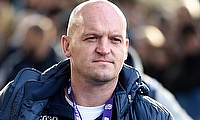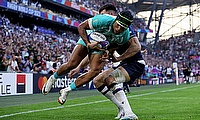Should Italy withdraw from the PRO12
One of the worst kept secrets in rugby was finally let out into the open last month when Harlequins’ director of rugby Conor O’Shea was announced as the new Italy head coach.
The Irishman will need all of his coaching and administration experience from Harlequins, London Irish and the RFU to turnaround the Azzurri, whose trajectory has taken a worrying downward turn in recent years.
One of the crux’s of Italy’s downfall has been the debatable influence of the Guinness PRO12 on the two sides they enter into the competition, Zebre and Benetton Treviso.
The Italian Rugby Federation (FIR) came close to withdrawing both sides from the competition in 2014 due to concerns over the competition’s viability moving forward but after discussions with the respective unions in Ireland, Scotland and Wales, they committed two Italian sides to the competition for a further four years. The end of this 2015/16 season will mark the halfway point in that commitment.
The question O’Shea needs to be asking himself is whether or not he should be pushing the FIR to extend that commitment or have them cut their losses and focus on their domestic competition, the National Championship of Excellence.
For years, the FIR has been haemorrhaging money to the Celtic nations for inclusion in the PRO12, preventing them from properly funding either Zebre (and Aironi previously) or Treviso and ultimately seeing both teams at the bottom of the competition’s standings. Treviso and Zebre/Aironi have both finished in the bottom three of the competition in four of the five years they have been involved in it, with Treviso’s 7th in the 2012/13 season the only exception. An Italian team has always finished bottom of the competition since their inclusion in the 2010/11 season.
Both clubs are struggling to develop players to an international standard, which is the opposite of what it was hoped their introduction to the Celtic League would spark. With the FIR unable to compete financially with the Aviva Premiership and Top 14 sides, the few players they do develop to a high level, such as Michele Campagnaro and Joshua Furno, are often picked off by foreign clubs.
That said, the National Championship of Excellence is beginning to show signs that it is a more productive developer of Italian talent than either Zebre or Treviso, who regularly find themselves on the back foot, taking thumpings from other PRO12 sides and are consequently unable to successfully develop their players’ skill sets.
In this year’s Six Nations, David Odiete of Mogliano and Mattia Bellini of Petrarca were two of Italy’s standout players and it perhaps shows that the difference in quality between the two Italian PRO12 sides and the National Championship of Excellence is not as vast as some would have you believe.
With more registered clubs and male players than Wales, Ireland or Scotland, Italy is still the sleeping giant that it was when they were inducted into the Six Nations back in 2000. There is considerable potential still to be realised, especially if the game can start to take a hold in the south of the country, not just it’s traditional stronghold in the north. More funding and focus on the country’s national competition could help do just that.
There are of course a number of risks in withdrawing from the PRO12, not least so what it would do for Italy’s standing in the European Rugby competitions and Six Nations. With pressure emanating from Wales and Ireland to strip the highest-finishing Italian side of its Champions Cup place should they finish outside of the top seven, the former might not be as much of a concern moving forward.
The status quo, however, is not working for Italy and they seem to be a team in freefall. If this is not the time for bold moves, then when will it be? The future retirements of icons of Italian rugby such as Sergio Parisse, Martin Castrogiovanni and Andrea Masi must be on O’Shea’s mind and as things stand, there are not equally effective replacements waiting in the wings.
A thriving Italian national team would be a real boon to European and northern hemisphere rugby, but without drastic change, it just doesn’t seem a possibility.








